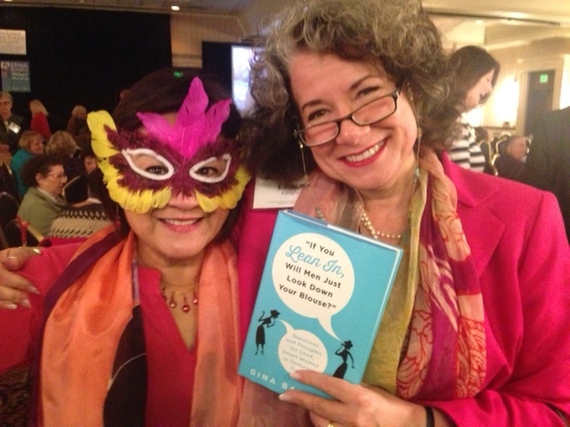(Photo of Suzette Standring and Gina Barreca at the 2016 Erma Bombeck Writers Conference. Suzette is wearing the tribal mask for "smart, loud, funny women" - thanks for the gift, Gina!)
A smart, competent female writer stood up to share her thoughts. "I'm sorry to take up the time...I'm probably wrong, but..." Many repeat variations of this phrase. It's a quiver of arrows we aim at ourselves. Ladies, can we stop apologizing for and over-explaining our work?
As nurturers we crave rapport, and pooh-poohing ourselves is a form of bonding. At best our intent is humility or self-effacement, but it conveys, "Forgive me for having thoughts."
At the 2016 Erma Bombeck Writers Conference speaker Gina Barreca hit a hilarious home run about overcoming such unworthiness. Over three hundred talented female writers (and nine men) converged in Dayton. Quips, comedy, and profound family essays are their mainstay.
Yet for three days the automatic apologies and the self-put-downs became acceptable background chatter. Instead of the white noise of surf, it was a mumble of mea culpas.
I've been guilty, too. For years, I could not simply say, "Why, thank you." No. My standard reply was "Oh, if I can do it, a chimp can do it." It was a man who said, "Knock it off. It raises questions for anyone who wants to work you."
Also, the kissing cousin to the "apology" is the long wind-up pitch. You know, giving a pre-explanation for the explanation about work. Example: "What's your blog about?" "Well, back when I was ten..."
I suspect the long wind-up pitch is born from a desire to be understood fully. Never will that be. The Omnipotent Oz is an illusion. A one-sentence description, carefully crafted, is plenty because your work will speak for you.
It took me years to undo these bad habits. My ex-husband, a trial lawyer, served as Professor Higgins to my Eliza Doolittle.
My apology was my typical opener, "Is this a good time? I know you're tired. It's no big deal.
Then came my long wind-up pitch.
Me: You remember I told you blah-blah-blah that happened a few years ago, and remember how lately I was thinking yak-yak-yak...."
Ken: "Suze, can you give it to me in 25 words or less?"
Me: "I crashed the car but nobody was hurt."
How freeing to reclaim 20 minutes of my life! No extra toppings. The cheese stands alone. Over time it became my model for communication.
It's powerful to get to the point. I saw this during "Speed Dating for Writers" at the EBWW conference. Each attendee had five minutes to get advice from an expert, such as literary agents, self-publishing, memoir, and more. I offered tips about syndication.
Without the conversation tags, we were so productive, talking as fast as Texas auctioneers.
Be mindful of how your opening comments reflect on you. Nix the phrases that equal "It's not worth it to listen to me." Own the mindset, "I have something to say that could help you, too."
Lulu, my 8-year old granddaughter, told me, "Say it with sass with a snap on top!"
Email Suzette Standring: suzmar@comcast.net or visit www.readsuzette.com
Suzette is a writing workshop presenter, award winning author, and syndicated columnist with GateHouse Media.
Our 2024 Coverage Needs You
It's Another Trump-Biden Showdown — And We Need Your Help
The Future Of Democracy Is At Stake
Our 2024 Coverage Needs You
Your Loyalty Means The World To Us
As Americans head to the polls in 2024, the very future of our country is at stake. At HuffPost, we believe that a free press is critical to creating well-informed voters. That's why our journalism is free for everyone, even though other newsrooms retreat behind expensive paywalls.
Our journalists will continue to cover the twists and turns during this historic presidential election. With your help, we'll bring you hard-hitting investigations, well-researched analysis and timely takes you can't find elsewhere. Reporting in this current political climate is a responsibility we do not take lightly, and we thank you for your support.
Contribute as little as $2 to keep our news free for all.
Can't afford to donate? Support HuffPost by creating a free account and log in while you read.
The 2024 election is heating up, and women's rights, health care, voting rights, and the very future of democracy are all at stake. Donald Trump will face Joe Biden in the most consequential vote of our time. And HuffPost will be there, covering every twist and turn. America's future hangs in the balance. Would you consider contributing to support our journalism and keep it free for all during this critical season?
HuffPost believes news should be accessible to everyone, regardless of their ability to pay for it. We rely on readers like you to help fund our work. Any contribution you can make — even as little as $2 — goes directly toward supporting the impactful journalism that we will continue to produce this year. Thank you for being part of our story.
Can't afford to donate? Support HuffPost by creating a free account and log in while you read.
It's official: Donald Trump will face Joe Biden this fall in the presidential election. As we face the most consequential presidential election of our time, HuffPost is committed to bringing you up-to-date, accurate news about the 2024 race. While other outlets have retreated behind paywalls, you can trust our news will stay free.
But we can't do it without your help. Reader funding is one of the key ways we support our newsroom. Would you consider making a donation to help fund our news during this critical time? Your contributions are vital to supporting a free press.
Contribute as little as $2 to keep our journalism free and accessible to all.
Can't afford to donate? Support HuffPost by creating a free account and log in while you read.
As Americans head to the polls in 2024, the very future of our country is at stake. At HuffPost, we believe that a free press is critical to creating well-informed voters. That's why our journalism is free for everyone, even though other newsrooms retreat behind expensive paywalls.
Our journalists will continue to cover the twists and turns during this historic presidential election. With your help, we'll bring you hard-hitting investigations, well-researched analysis and timely takes you can't find elsewhere. Reporting in this current political climate is a responsibility we do not take lightly, and we thank you for your support.
Contribute as little as $2 to keep our news free for all.
Can't afford to donate? Support HuffPost by creating a free account and log in while you read.
Dear HuffPost Reader
Thank you for your past contribution to HuffPost. We are sincerely grateful for readers like you who help us ensure that we can keep our journalism free for everyone.
The stakes are high this year, and our 2024 coverage could use continued support. Would you consider becoming a regular HuffPost contributor?
Dear HuffPost Reader
Thank you for your past contribution to HuffPost. We are sincerely grateful for readers like you who help us ensure that we can keep our journalism free for everyone.
The stakes are high this year, and our 2024 coverage could use continued support. If circumstances have changed since you last contributed, we hope you'll consider contributing to HuffPost once more.
Already contributed? Log in to hide these messages.

